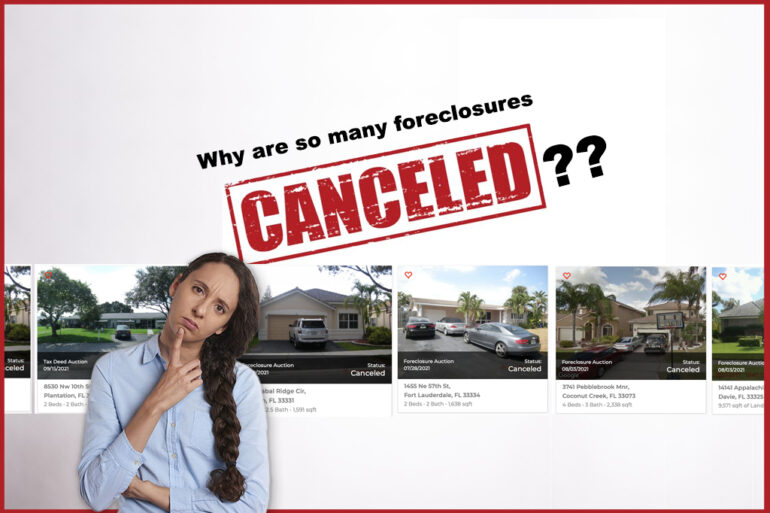Why Are County Foreclosure Auctions Often Canceled?
Why Are County Foreclosures Often Canceled?
The short answer — most often it has just been delayed, not canceled.
When a homeowner cannot pay the mortgage, it is within the mortgage company’s right to foreclose on the home. The legal process begins with the bank forcing the sale of the house to recoup the remaining loan balance. Eventually this process ends with a clerk sale, where the property is auctioned on behalf of the plaintiff, giving third-party bidders such as yourself a chance to buy the property.
If you are a PropertyOnion.com member, you can quickly see that for every property sold to a third-party bidder, three are canceled. Why do so many properties appear as “canceled” in the county foreclosure auction results? Several things can happen to cause the cancellation of a foreclosure.
Canceled and Soon-to-Be Rescheduled Foreclosure Auctions
There are many layers of procedures and paperwork required to complete a foreclosure properly and legally. After the Great Recession, we saw all kinds of problems with foreclosures being pushed through the courts. Many of the issues came down to procedures and paperwork being done too quickly and carelessly (and even fraudulently).
After the messes (robo signings) created by this the last decade, after all the lawsuits and rule enactments, things are done more methodically now. There are more checks in place to make sure the foreclosure is legitimate and compliant.
Here are some of the reasons for a cancellation or a rescheduled foreclosure sale date.
The Plaintiff Didn’t Submit Proof of Publication in Time
It’s that simple — the lender must publish a notice of the foreclosure sale in a newspaper once a week for two consecutive weeks, with the second publication being at least five days before the sale (Fla. Stat. § 45.031). When it came time to show proof of this publication to the county, they failed to do so or didn’t meet the standard.
The Homeowner’s Attorney Is Using Stall Tactics to Delay the Sale
Many homeowners use experienced and court-hardened foreclosure defense specialists to delay the foreclosure sale as long as possible. There are all kinds of tools these attorneys use to delay the sale date.
Some foreclosure sales are scheduled and canceled over months and even years on end thanks to attorneys filing motions over and over to bog down the bank’s attorneys with paperwork requests.
Savvy investors may use these delay tactics to squeeze every dime out of the properties before the bank forecloses, but other times it might be a homeowner fighting to keep a roof over their head. We have to keep in mind there is often more than money being fought over each day in the county foreclosure courts.
The Homeowner Files for Bankruptcy Protection
The property owner may have either exhausted all delay options or legitimately needs to file bankruptcy, and this would instantly delay the foreclosure.
Filing for Chapter 7 or 13 bankruptcy creates an automatic stay, which means the bank and other creditors cannot continue trying to collect on their debts. The sale of the property can be delayed three or four months once the intent to file bankruptcy is filed with the court.
Things That Can Cancel the Foreclosure Case Altogether
Short Sale
The homeowner can take matters into their own hands by initiating a short sale. The financially defunct homeowner can sell to a third party, and proceeds from the sale go directly to the lender. The lender either accepts the proceeds as full payment or files a deficiency judgment against the homeowner.
A deficiency judgment requires the homeowner to pay the difference between the net proceeds and the entire amount owed on the original loan.
Once the homeowner is in default, the bank will threaten foreclosure proceedings. Because foreclosure proceedings can ruin a person’s credit and cause embarrassment, the homeowner may elect a short sale as an alternative because it typically does not drastically affect the seller’s credit. The listing itself appears to be like any other in the neighborhood. The short sale cancels the foreclosure — a win for the defaulted homeowner.
Here’s how it works. The homeowner can request permission to short sell. Keep in mind that the home must be underwater. Not literally — it means that the owner cannot have enough equity in the home to break even or profit in a traditional foreclosure sale.
A property analysis will determine the value. Once approved, the homeowner, now called the seller, has a tiny bit of control over the property’s fate. Once the lender approves the short sale, it becomes the seller’s responsibility.
Of course, the lender decides on the price and accepts or rejects all offers. If a bid is accepted, the lender collects the proceeds, and the seller walks away free and clear or owing the difference between the money collected and the money owed, depending on the agreement.
Homeowners seeking a short sale in California and Nevada are in luck because default judgments are generally prohibited in those states, except under certain circumstances.
Splitting the Difference to End Foreclosure Proceedings
Mitigating loss with the lender is another way to cancel a foreclosure. A savvy homeowner may persuade the lender to accept different terms for repayment, like paused payments through a forbearance.
A forbearance allows the homeowner to defer payments for a specific time and resume repayment, including the deferred payments during the life of the loan, or add more time to the end of the loan for repayment. Either way, once approved, the foreclosure is no longer active.
The Biden administration responded to the many people facing foreclosure by extending the moratorium on foreclosure proceedings established by former President Donald Trump. The moratorium prohibits mortgage companies from initiating foreclosure proceedings on those homeowners who were behind on payments and could provide proof of financial hardship due to the pandemic.
Since its inception, the moratorium has been extended several times, saving people the devastation of losing their most significant asset — their home.
Loan Modification May Change Everything
The lender may agree to restructure the loan terms by lowering the interest rate or extending the loan terms to create an affordable payment for the homeowner. Sound a lot like refinancing?
It is actually a loan modification and may help the defaulted homeowner permanently change the loan terms by embedding the defaulted sum into a new loan with new terms. It is not the best option because interest rates may differ from the original rate, but it just might cancel the foreclosure.
Take the Keys, Please
A homeowner can literally hand the bank the keys to their home by signing a deed in lieu of foreclosure. A deed in lieu of foreclosure is a legal document that transfers the title of a home back to the lender.
In other words, the homeowner is no longer obligated, and the home now belongs to the bank. Foreclosure over.
Paying Off the Lien Completely
Although there is a slim chance of winning the Powerball, coming into a large sum of money may be just the ticket for a homeowner to pay off his debt and can be done in two ways.
Reinstatement means that the homeowner collected enough money to bring the loan payments up to date. If the homeowner musters up enough money, they may elect to pay off the entire loan to call off the dogs.
Whether an owner reinstates the loan or pays off the loan, additional fees and costs must be satisfied to cancel the foreclosure.
In the end, most of the properties that have a “canceled” sale result end up being relisted a few weeks or months later. Although you might be discouraged if you spent time researching an auction property only to find it canceled on the morning of the auction, don’t throw away your research. It will probably end up back on the calendar in the coming days.








